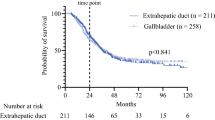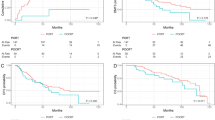Abstract
Background
Severe morbidity after cytoreductive surgery (CRS) followed by hyperthermic intraperitoneal chemotherapy (HIPEC) is, besides the obvious short-term consequences, associated with impaired long-term outcomes. The risk factors for severe morbidity in patients with peritoneal carcinomatosis (PC) of colorectal origin are poorly defined. This study aimed to identify risk factors for severe morbidity after CRS + HIPEC in patients with colorectal PC.
Methods
Patients with colorectal PC who underwent CRS + HIPEC between 2007 and 2015 were categorized and compared between those with and those without severe morbidity. Risk factors were identified using logistic regression analysis. Morbidity was graded according to the Clavien–Dindo classification, with grade 3 or higher indicating severe morbidity.
Results
This study included 211 patients, of whom 53 patients (25.1 %) experienced morbidity of grade 3 or higher. The identified risk factors for severe morbidity were extensive prior surgery [odds ratio (OR) 4.3], a positive recent smoking history (OR 4.0), a poor physical performance status (OR 2.9), and extensive cytoreduction (OR 1.2 per additional resection). Patients with a greater number of risk factors more often had severe morbidity and higher reoperation, readmission, and mortality rates. Furthermore, an internally validated preoperative prediction model for severe morbidity with an area under the curve of 70 % was constructed.
Conclusion
The current study identified risk factors for severe morbidity after CRS + HIPEC in patients with colorectal PC. Patients with a combination of risk factors have a substantial risk of severe morbidity and therefore should be carefully selected for CRS + HIPEC. The preoperative decision model can be a valuable additional tool in this process of patient selection.


Similar content being viewed by others
References
Elias D, Gilly F, Boutitie F, et al. Peritoneal colorectal carcinomatosis treated with surgery and perioperative intraperitoneal chemotherapy: retrospective analysis of 523 patients from a multicentric French study. J Clin Oncol. 2010;28:63–8.
Chua TC, Yan TD, Saxena A, Morris DL. Should the treatment of peritoneal carcinomatosis by cytoreductive surgery and hyperthermic intraperitoneal chemotherapy still be regarded as a highly morbid procedure?: a systematic review of morbidity and mortality. Ann Surg. 2009;249:900–7.
Baratti D, Kusamura S, Iusco D, et al. Postoperative complications after cytoreductive surgery and hyperthermic intraperitoneal chemotherapy affect long-term outcome of patients with peritoneal metastases from colorectal cancer: a two-center study of 101 patients. Dis Colon Rectum. 2014;57:858–68.
Simkens GA, van Oudheusden TR, Luyer MD, et al. Serious postoperative complications affect early recurrence after cytoreductive surgery and HIPEC for colorectal peritoneal carcinomatosis. Ann Surg Oncol. 2015;22:2656–62.
Seretis C, Youssef H. Quality of life after cytoreductive surgery and intraoperative hyperthermic intraperitoneal chemotherapy for peritoneal surface malignancies: a systematic review. Eur J Surg Oncol. 2014;40:1605–13.
Hammond J, Lim S, Wan Y, Gao X, Patkar A. The burden of gastrointestinal anastomotic leaks: an evaluation of clinical and economic outcomes. J Gastrointest Surg. 2014;18:1176–85.
Baratti D, Kusamura S, Mingrone E, Balestra MR, Laterza B, Deraco M. Identification of a subgroup of patients at highest risk for complications after surgical cytoreduction and hyperthermic intraperitoneal chemotherapy. Ann Surg. 2012;256:334–41.
Ihemelandu CU, McQuellon R, Shen P, Stewart JH, Votanopoulos K, Levine EA. Predicting postoperative morbidity following cytoreductive surgery with hyperthermic intraperitoneal chemotherapy (CS + HIPEC) with preoperative FACT-C (Functional Assessment of Cancer Therapy) and patient-rated performance status. Ann Surg Oncol. 2013;20:3519–26.
Randle RW, Ahmed S, Levine EA, et al. Significance of diabetes on morbidity and mortality following cytoreductive surgery with hyperthermic intraperitoneal chemotherapy. J Surg Oncol. 2015;111:740–45.
Chua TC, Moran BJ, Sugarbaker PH, et al. Early- and long-term outcome data of patients with pseudomyxoma peritonei from appendiceal origin treated by a strategy of cytoreductive surgery and hyperthermic intraperitoneal chemotherapy. J Clin Oncol. 2012;30:2449–56.
Yan TD, Deraco M, Baratti D, et al. Cytoreductive surgery and hyperthermic intraperitoneal chemotherapy for malignant peritoneal mesothelioma: multi-institutional experience. J Clin Oncol. 2009;27:6237–42.
Dindo D, Demartines N, Clavien PA. Classification of surgical complications: a new proposal with evaluation in a cohort of 6336 patients and results of a survey. Ann Surg. 2004;240:205–13.
Simkens GA, van Oudheusden TR, Braam HJ, et al. Treatment-related mortality after cytoreductive surgery and HIPEC in patients with colorectal peritoneal carcinomatosis is underestimated by conventional parameters. Ann Surg Oncol. 2015. doi:10.1245/s10434-015-4699-5.
van Oudheusden TR, Braam HJ, Nienhuijs SW, et al. Cytoreduction and hyperthermic intraperitoneal chemotherapy: a feasible and effective option for colorectal cancer patients after emergency surgery in the presence of peritoneal carcinomatosis. Ann Surg Oncol. 2014;21:2621–6.
Harrell FE Jr. Rms: Regression Modeling Strategies. R package version 4.3–1. http://www.r-project.org/
Steyerberg EW, Harrell FE Jr., Borsboom GJ, Eijkemans MJ, Vergouwe Y, Habbema JD. Internal validation of predictive models: efficiency of some procedures for logistic regression analysis. J Clin Epidemiol. 2001;54:774–81.
Steyerberg EW, Vickers AJ, Cook NR, et al. Assessing the performance of prediction models: a framework for traditional and novel measures. Epidemiology. 2010;21:128–38.
Artinyan A, Orcutt ST, Anaya DA, Richardson P, Chen GJ, Berger DH. Infectious postoperative complications decrease long-term survival in patients undergoing curative surgery for colorectal cancer: a study of 12,075 patients. Ann Surg. 2015;261:497–505.
Yin Z, Huang X, Ma T, et al. Postoperative complications affect long-term survival outcomes following hepatic resection for colorectal liver metastasis. World J Surg. 2015;39:1818–27.
Chua TC, Liauw W, Zhao J, Morris DL. Upfront compared to delayed cytoreductive surgery and perioperative intraperitoneal chemotherapy for pseudomyxoma peritonei is associated with considerably lower perioperative morbidity and recurrence rate. Ann Surg. 2011;253:769–73.
Sharma A, Deeb AP, Iannuzzi JC, Rickles AS, Monson JR, Fleming FJ. Tobacco smoking and postoperative outcomes after colorectal surgery. Ann Surg. 2013;258:296–300.
Thomsen T, Villebro N, Moller AM. Interventions for preoperative smoking cessation. Cochrane Database Syst Rev. 2014;3:CD002294
Reuter NP, Macgregor JM, Woodall CE, et al. Preoperative performance status predicts outcome following heated intraperitoneal chemotherapy. Am J Surg. 2008;196:909–13 (discussion 913–904).
Cristobal I, Manso R, Rincon R, et al. Phosphorylated protein phosphatase 2A determines poor outcome in patients with metastatic colorectal cancer. Br J Cancer. 2014;111:756–62.
Jehn CF, Boning L, Kroning H, Pezzutto A, Luftner D. Influence of comorbidity, age, and performance status on treatment efficacy and safety of cetuximab plus irinotecan in irinotecan-refractory elderly patients with metastatic colorectal cancer. Eur J Cancer. 2014;50:1269–75.
van Vugt JL, Braam HJ, van Oudheusden TR, et al. Skeletal muscle depletion is associated with severe postoperative complications in patients undergoing cytoreductive surgery with hyperthermic intraperitoneal chemotherapy for peritoneal carcinomatosis of colorectal cancer. Ann Surg Oncol. 2015;22:3625–31.
Franko J, Gusani NJ, Holtzman MP, et al. Multivisceral resection does not affect morbidity and survival after cytoreductive surgery and chemoperfusion for carcinomatosis from colorectal cancer. Ann Surg Oncol. 2008;15:3065–72.
Kuijpers AM, Mirck B, Aalbers AG, et al. Cytoreduction and HIPEC in the Netherlands: nationwide long-term outcome following the Dutch protocol. Ann Surg Oncol. 2013;20:4224–30.
Hompes D, D’Hoore A, Wolthuis A, et al. The use of oxaliplatin or mitomycin C in HIPEC treatment for peritoneal carcinomatosis from colorectal cancer: a comparative study. J Surg Oncol. 2014;109:527–32.
Disclosure
There are no conflicts of interest.
Author information
Authors and Affiliations
Corresponding author
Electronic supplementary material
Below is the link to the electronic supplementary material.
Rights and permissions
About this article
Cite this article
Simkens, G.A., van Oudheusden, T.R., Luyer, M.D. et al. Predictors of Severe Morbidity After Cytoreductive Surgery and Hyperthermic Intraperitoneal Chemotherapy for Patients With Colorectal Peritoneal Carcinomatosis. Ann Surg Oncol 23, 833–841 (2016). https://doi.org/10.1245/s10434-015-4892-6
Received:
Published:
Issue Date:
DOI: https://doi.org/10.1245/s10434-015-4892-6




